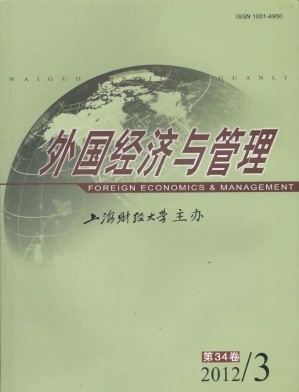技术创新收益机制研究前沿探析
外国经济与管理 2012 年 第 34 卷第 03 期, 页码:20 - 30
摘要
参考文献
摘要
随着开放源和中间技术市场等更加复杂的知识分工形式的不断涌现,可收益性和收益机制迄今仍是国外技术创新研究领域最具挑战性、最活跃的研究议题。本文在对技术创新可收益性概念尤其是收益机制的概念、问题和研究发现进行系统梳理的基础上,重点探讨各类制度性收益机制和策略性收益机制的经济学内涵以及不同机制之间的替代性和互补性问题。本文认为,衍生制度性收益机制设计以及将制度性收益机制和策略性收益机制置于统一框架下的研究,是未来该领域进行理论拓展的重要方向。
①法学领域关于专利权客体的讨论主要是从技术类型的角度展开的,如传统的专利权客体主要包括机器、工业过程、物质组成等,而对于自然规律、自然现象和抽象想法等的发现则不在传统的专利权客体的范畴。当然,由于计算机软件技术、信息技术和生物技术的发展不断对既有的专利权客体外延提出挑战,法学家们也在重新界定恰当的专利权客体范围。详细的相关讨论可以参见Merges等(2006)。从经济学的角度看,每一类客体都可能包含可解码或不可解码技术知识。
[1]Anton J J and Yao D A.Expropriation and inventions:Appro-priable rents in the absence of property rights[J].American Economic Review,1994,84(1):190-209.
[2]Boldrin M and Levine D.Against intellectual monopoly[M].London:Cambridge University Press,2008.
[3]Chesbrough H.Orchestrating appropriation[A].Shane S(Ed.).Handbook of technology and innovation management[C].Manhattan:Wiley Press,2008.
[4]Cohen W M,et al.Protecting their intellectual assets:Appro-priability conditions and why US manufacturing firms patent(or not)[R].NBER working paper,2000.
[5]Cornelli F and Schankerman M.Patent renewals and R&D in-centives[J].Rand Journal of Economics,1999,30(2):197-213.
[6]Farrell J.Arguments for weaker intellectual property protec-tion in network industries[J].Standard View,1995,3(2):46-49.
[7]Gallini N and Scotchmer S.Intellectual property:When is it the best incentive mechanism?[J].Innovation Policy and E-conomy,2002,2(1):51-78.
[8]Gelabert L,et al.Does the effect of public support for R&D depend on the degree of appropriability?[J].Journal of Indus-trial Economics,2009,57(4):736-767.
[9]Geroski P A.Do spillovers undermine the incentive to innovate[A].Dowrick S(Ed.).Economic approaches to innovation[C].Cheltenham:Elgar,1995.
[10]Jacobides M G,et al.Benefiting from innovation[J].Research Policy,2006,35(8):1200-1221.
[11]Jaffe A and Lerner J.Innovation and its discontents[M].Princeton:Princeton University Press,2004.
[12]Jensen P H and Webster E.Knowledge management:Does capture Impede creation?[J].Industrial and Corporate Change,2009,18(4):701-710.
[13]Kitch E.Patents[M].New York:Macmillan Reference,1998.
[14]Kremer M.Patent buyouts:A mechanism for encouraging in-novation[J].Quarterly Journal of Economics,1998,113(4):1137-1167.
[15]Levin R C,et al.Appropriating the returns from industrial research and development[J].Brookings Papers on Economic Activity,1987,13(3):783-831.
[16]Lieberman M B and Montgomery D B.First mover(dis)ad-vantages:Retrospective and link with the resource-based view[J].Strategic Management Journal,1998,19(12):1111-1125.
[17]Maurer S M and Scotchmer S.Procuring knowledge[A].Li-becap G(Ed.).Advances in the study of entrepreneurship,innovation and growth[C].New York:Elsevier,2005.
[18]Merges R P and Nelson R R.On the complex economics of patent scope[J].Columbia Law Review,1990,190(4):839-916.
[19]Pisano G.Profiting from innovation and the intellectual pro-perty revolution[J].Research Policy,2006,35(8):1122-1130.
[20]Pisano G and Teece D.How to capture value from innova-tion:Shaping intellectual property and industry architecture[J].California Management Review,2007,50(1):278-296.
[21]Saviotti P P.On the dynamics of appropriability of tacit and of codified knowledge[J].Research Policy,1998,26(7):843-856.
[22]Scotchmer S.On the optimality of the patent renewal system[J].Rand Journal of Economics,1999a,30(2):181-196.
[23]Scotchmer S.Delegating effort in a common value project[R].IBER Working Paper,1999b.
[24]Scotchmer S.Innovation and incentives[M].Massachusetts:MIT Press,2004.
[25]Shapiro C.Navigating the patent thicket:Cross licenses,pa-tent pools and standard setting[A].Jaffe A,et al(Eds.).In-novation policy and the economy[C].Massachusetts:MIT Press,2001.
[26]Shavell S and Van Ypersele T.Rewards versus intellectual property rights[J].Journal of Law and Economics,2001,44(2):525-547.
[27]Teece D J.Reflections on“profiting from innovation”[J].Re-search Policy,2006,35(8):1131-1146.
[28]Teece D J.Profiting from technological innovation:Implica-tions for integration,collaboration,licensing and public policy[J].Research Policy,1986,15(6):285-305.
[29]Teece D.The strategic management of technological and in-tellectual property[A].Faulkner D and Campbell A(Eds.).Oxford handbook of strategy[C].Oxford:Oxford University Press,2003.
[30]Wright B D.The economics of invention incentives:Patents,prizes,and research contracts[J].American Economic Re-view,1983,73(4):691-707.
[1]Anton J J and Yao D A.Expropriation and inventions:Appro-priable rents in the absence of property rights[J].American Economic Review,1994,84(1):190-209.
[2]Boldrin M and Levine D.Against intellectual monopoly[M].London:Cambridge University Press,2008.
[3]Chesbrough H.Orchestrating appropriation[A].Shane S(Ed.).Handbook of technology and innovation management[C].Manhattan:Wiley Press,2008.
[4]Cohen W M,et al.Protecting their intellectual assets:Appro-priability conditions and why US manufacturing firms patent(or not)[R].NBER working paper,2000.
[5]Cornelli F and Schankerman M.Patent renewals and R&D in-centives[J].Rand Journal of Economics,1999,30(2):197-213.
[6]Farrell J.Arguments for weaker intellectual property protec-tion in network industries[J].Standard View,1995,3(2):46-49.
[7]Gallini N and Scotchmer S.Intellectual property:When is it the best incentive mechanism?[J].Innovation Policy and E-conomy,2002,2(1):51-78.
[8]Gelabert L,et al.Does the effect of public support for R&D depend on the degree of appropriability?[J].Journal of Indus-trial Economics,2009,57(4):736-767.
[9]Geroski P A.Do spillovers undermine the incentive to innovate[A].Dowrick S(Ed.).Economic approaches to innovation[C].Cheltenham:Elgar,1995.
[10]Jacobides M G,et al.Benefiting from innovation[J].Research Policy,2006,35(8):1200-1221.
[11]Jaffe A and Lerner J.Innovation and its discontents[M].Princeton:Princeton University Press,2004.
[12]Jensen P H and Webster E.Knowledge management:Does capture Impede creation?[J].Industrial and Corporate Change,2009,18(4):701-710.
[13]Kitch E.Patents[M].New York:Macmillan Reference,1998.
[14]Kremer M.Patent buyouts:A mechanism for encouraging in-novation[J].Quarterly Journal of Economics,1998,113(4):1137-1167.
[15]Levin R C,et al.Appropriating the returns from industrial research and development[J].Brookings Papers on Economic Activity,1987,13(3):783-831.
[16]Lieberman M B and Montgomery D B.First mover(dis)ad-vantages:Retrospective and link with the resource-based view[J].Strategic Management Journal,1998,19(12):1111-1125.
[17]Maurer S M and Scotchmer S.Procuring knowledge[A].Li-becap G(Ed.).Advances in the study of entrepreneurship,innovation and growth[C].New York:Elsevier,2005.
[18]Merges R P and Nelson R R.On the complex economics of patent scope[J].Columbia Law Review,1990,190(4):839-916.
[19]Pisano G.Profiting from innovation and the intellectual pro-perty revolution[J].Research Policy,2006,35(8):1122-1130.
[20]Pisano G and Teece D.How to capture value from innova-tion:Shaping intellectual property and industry architecture[J].California Management Review,2007,50(1):278-296.
[21]Saviotti P P.On the dynamics of appropriability of tacit and of codified knowledge[J].Research Policy,1998,26(7):843-856.
[22]Scotchmer S.On the optimality of the patent renewal system[J].Rand Journal of Economics,1999a,30(2):181-196.
[23]Scotchmer S.Delegating effort in a common value project[R].IBER Working Paper,1999b.
[24]Scotchmer S.Innovation and incentives[M].Massachusetts:MIT Press,2004.
[25]Shapiro C.Navigating the patent thicket:Cross licenses,pa-tent pools and standard setting[A].Jaffe A,et al(Eds.).In-novation policy and the economy[C].Massachusetts:MIT Press,2001.
[26]Shavell S and Van Ypersele T.Rewards versus intellectual property rights[J].Journal of Law and Economics,2001,44(2):525-547.
[27]Teece D J.Reflections on“profiting from innovation”[J].Re-search Policy,2006,35(8):1131-1146.
[28]Teece D J.Profiting from technological innovation:Implica-tions for integration,collaboration,licensing and public policy[J].Research Policy,1986,15(6):285-305.
[29]Teece D.The strategic management of technological and in-tellectual property[A].Faulkner D and Campbell A(Eds.).Oxford handbook of strategy[C].Oxford:Oxford University Press,2003.
[30]Wright B D.The economics of invention incentives:Patents,prizes,and research contracts[J].American Economic Re-view,1983,73(4):691-707.
引用本文
贺俊, 王钦, 邓洲, 等. 技术创新收益机制研究前沿探析[J]. 外国经济与管理, 2012, 34(3): 20–30.
导出参考文献,格式为:
本期封面
相关论文





 6654
6654  690
690

